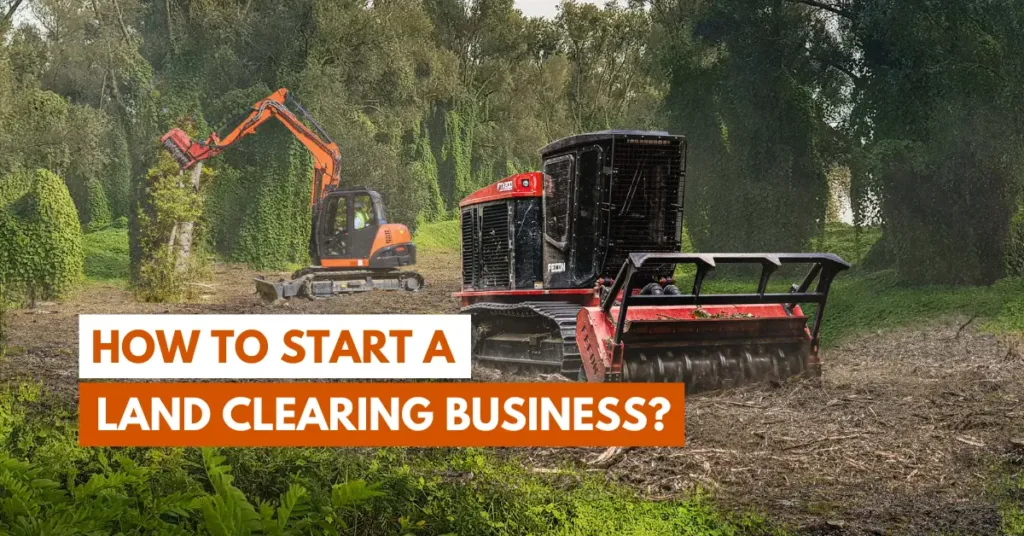Is the idea of turning heavily forested areas into excellent construction sites appealing to you? Does the thought of operating large machinery to clear land for urban development spark your interest as an entrepreneur? Do you wonder how to start a land clearing business and turn your passion for environmental transformation into a profitable business? If yes, this read has everything you are looking for.
Starting a land clearing business allows you to enter a dynamic industry where every cleared acre leads to progress. But taking on this adventure calls for more than just a passion for the great outdoors. It also calls for careful preparation, industry expertise, and a calculated approach. In this guide, we will go over the essential steps and insights required to successfully launch and grow a land clearing business.
What is a Land Clearing Business?
Before we begin discussing how to start a land clearing business, it is crucial for us to understand what a land clearing business itself is. When a designated area needs to be cleared for construction, agriculture, or other uses, a land clearing business specializes in removing obstacles like trees, vegetation, rocks, and debris from it.
These companies effectively remove natural barriers to create clear and usable spaces by using heavy machinery such as excavators and bulldozers. Clearing land is necessary for many different types of projects, such as infrastructure projects, environmental restoration projects, and residential and commercial developments.
A land clearing business’s success is dependent on skilled operators, dedication to environmental regulations, and a commitment to efficient, environmentally friendly land transformation.
9 Easy Steps to Start a Land Clearing Business
Below is a list of steps you need to establish a successful land clearing business. Let’s look at them one by one.
1. Conduct Thorough Research
The first step in launching a land clearing business is to conduct research. Starting a land clearing business requires a thorough understanding of the market environment. It is essential to carry out in-depth research to determine potential competitors, assess market demand, and identify industry trends prior to beginning this business.
By researching the specific types of land clearing services in high demand in your target area, you may customize your offerings to meet the needs of the local market.
A crucial component of this research also involves a careful analysis of your competitors. This is essential because it helps enable you to identify the unique selling point that makes your business stand out. In addition to this, an entrepreneur in the land clearing industry needs to understand the regulatory environment.
2. Developing a Business Plan
Creating a strong land clearing business plan is similar to laying the groundwork for a profitable business or start up. To craft a business plan, begin by writing down your objectives for the business, understanding your target market, determining your pricing strategy, the amount you will charge for your services, and your best estimates regarding financial matters (financial projections).
Make an estimate of the equipment and supplies required to clear the land, as well as the initial and ongoing costs. This plan serves as your roadmap, assisting you in making wise choices. It is also a useful document to present to potential investors or lenders. Thus, dedicate some time to organizing everything; you’ll be grateful for it in the end!
3. Obtain Necessary Certifications and Permits
Clearing land necessitates a thorough approach to safety and legal compliance. Because there will be heavy machinery involved along with potential risks, it is critical to put your team’s safety first.
Acquire the necessary licenses and authorizations to conduct operations according to local laws. This includes obtaining permitting clearances to comply with land-use regulations, obtaining licenses for the operation of heavy equipment, and securing environmental permits to minimize ecological impact. Carefully following these legal requirements will protect your company from legal issues while also ensuring the safety of your employees.
Purchasing full insurance coverage is essential, and it must be done in alignment with laws and regulations. Insurance serves as a safety net for your company’s finances, protecting it against possible losses brought on by mishaps or unexpected events.
In addition to reducing potential legal and financial risks, this double dedication to regulatory compliance and risk management builds a strong basis for the long-term, ethical operation of your land clearing company. It also builds client and stakeholder trust.
4. Acquiring the Right Equipment
Getting a solid piece of equipment is essential to starting a successful land clearing business. Bulldozers, excavators, forestry mulchers, and wood chippers are examples of essential equipment that are crucial in converting undeveloped land into places that are ready for construction. It is crucial to carefully weigh your options—new and used—while purchasing equipment to ensure that it fits within the limits of your budget.
But the journey doesn’t end with purchase; careful inspections and routine maintenance are essential to an operational lifespan. By following these steps, you can be sure that your equipment is operating at its best. This will avoid unplanned malfunctions and ensure smooth operations. Purchasing dependable machinery and providing careful maintenance is not just a precaution; it is also a key component in your land clearing business’s success.
5. Putting Together a Workforce
Developing a skilled workforce is essential to your land clearing company’s success. Make sure the operators you choose have experience operating heavy machinery and have the necessary expertise to handle the complexities of clearing land. In order to handle the difficulties of compliance, hire people who are knowledgeable about environmental regulations.
It is crucial to provide your staff with ongoing training so they are educated about the latest equipment technologies, safety regulations, and changing industry practices. In addition to improving operational efficiency, your company builds a reputation for excellence and dependability in the highly competitive land clearing services market by cultivating a knowledgeable and competent workforce.
6. Develop Marketing Strategies
Investing in a professional website and using social media platforms to effectively showcase your services can help your land clearing business establish a strong online presence. Use Search Engine Optimization (SEO) and other strategic digital marketing tactics to increase online visibility and draw in new customers. Engage in active networking with nearby builders, contractors, and real estate developers to generate valuable leads and promote cooperative relationships.
Furthermore, attract first-time clients by providing promotional packages or special discounts. This comprehensive strategy contributes to the long-term success and expansion of your land clearing business by increasing your brand’s online visibility and establishing strong ties within your local industry.
7. Adopt Sustainable Practices
Using sustainable land clearing techniques is not only a wise strategic move, but also a necessity in an era where environmental awareness is growing. Take on the challenge by trying out creative solutions like recycling or reusing materials removed from sites.
Think about using eco-friendly practices and reducing your impact on the environment wherever you can. Promoting sustainability helps the business position itself as a responsible player in the market while also aligning with global environmental goals.
You can also look for ways to demonstrate your dedication, such as presenting measurable results or being open and honest with clients about your environmentally friendly projects. Demand for environmentally friendly services rises along with awareness, giving your company a special chance to prosper in an increasingly eco-aware market.
8. Following Safety Measures
Safety is the top priority in the land clearing industry because it determines the business’s longevity and success. Strict safety procedures must be put in place in order to create a safety culture. This involves providing each team member thorough safety training so they are skilled in operating heavy equipment and following the right procedures.
In order to reduce potential risks related to land clearing activities, it is equally important to use Personal Protective Equipment (PPE), such as helmets, gloves, and safety vests, as required. After undergoing initial training, a commitment to safety must be continued and improved.
Update and evaluate safety measures on a regular basis in order to adapt to changing industry standards and laws. Frequent toolbox lectures and safety drills can emphasize how important it is to follow safety procedures.
A land clearing company can reduce the likelihood of accidents and improve its standing as a trustworthy and accountable service provider in a competitive marketplace by promoting a culture that prioritizes the overall wellness of the team.
9. Providing Excellent Customer Services
Long-term success in the highly competitive land clearing industry depends critically on building and preserving a positive reputation. Providing outstanding customer service is the key to establishing this reputation. Transparency and trust are created by effective communication, which guarantees that clients are informed at every stage of the project.
Meeting deadlines for projects demonstrates professionalism and dependability, as well as your dedication to fulfilling client expectations. Responding to client concerns quickly not only solves problems quickly but also demonstrates a commitment to customer satisfaction. The impact of excellent customer service goes beyond the completion of a project. Clients that are happy with your services become your biggest supporters and are likely to refer others to you.
Word-of-mouth recommendations that are based on the satisfaction and trust of previous customers can make a big difference in the gradual growth of your land clearing company. In a sector where trustworthiness and high-quality service are critical, building a reputation for providing outstanding customer service turns into a valuable asset that helps your company grow.
Final Thoughts
A combination of industry knowledge, strategic planning, and a dedication to quality are needed when you think about how to start a land clearing business. You can start a profitable and long-lasting land clearing company by carrying out in-depth research, creating a detailed business plan, gaining the required licenses, and putting effective operational procedures in place.
To stand out in a crowded market, concentrate on environmental sustainability, safety, and customer service. Your land clearing business can prosper and support the expansion of the construction sector if you take the appropriate steps.
Frequently Asked Questions (FAQs)
Q: What is the cheapest method of clearing land?
A: Depending on the size and vegetation of the area, the least expensive method of clearing land frequently involves manual techniques like hand clearing and controlled burns.
Q: What is the best way for clearing land?
A: For large-scale clearing projects, mechanical land clearing with heavy machinery is frequently the most effective and efficient technique.Q: How much does it cost to start a land clearing business?
A: A land clearing company’s initial costs can range from $50,000 to $150,000, depending on the kind of machinery, licenses, and size of operation.



